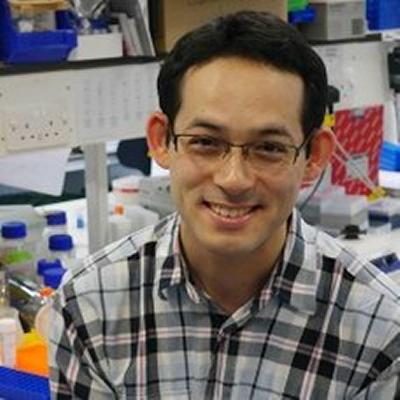Research interests
RNA splicing in genetic diagnostics
Working with Prof. Diana Baralle, we are trying to identify disease-causing mutations that alter RNA splicing in patients. We do this via the analysis of patient RNA samples using targeted methods such as RT-PCR and also transcriptome-wide methods like RNA-seq. As well as being the cause of many diseases, abnormal splicing can also be the consequence of a disease process. By identifying the splicing abnormalities that occur in different diseases, it may become possible to recognise characteristic splicing signatures that can help diagnose patients with specific disorders.
Oligonucleotide therapeutics
RNA molecules can potentially be thought of as highly specific drug targets. Antisense oligonucleotides (ASOs) are short nucleic acid-like molecules that can be designed to have base sequences that bind to specific RNA molecules through complementary base-pairing. The chemical properties of an ASO determines its effects once bound to a target RNA. Steric blocking chemistries can be used to mask key sequences involved in splicing and in this way ASOs can be used manipulate RNA splicing in a therapeutic way. Other ASO chemistries induce target RNA cleavage and this can be used to degrade toxic RNAs. By identifying other genetic diseases where abnormal RNA splicing occurs, we hope to provide a basis for the development of other therapeutic ASOs.
Functional Genomics (Wessex DIAMonD Project)
We have set up the Wessex Data-Integrated Analysis of Monogenic Disease (DIAMonD) Project as an over-arching functional genomics research project to study monogenic diseases. DIAMonD comprises a broad interdisciplinary group of researchers and clinicians from across the Wessex region who have an interest in unravelling the functional effects of genetic variants of uncertain significance that have been identified in patients undergoing genetic testing. The DIAMonD group meets on a regular basis to discuss potential research-based tests that could help clarify the effects of such variants in order to help classify their pathogenicity and thereby their diagnostic relevance.
Motor neurone disease
Amyotrophic lateral sclerosis (ALS) is an adult-onset incurable neurodegenerative disorder of motor neurones, leading to progressive weakness, paralysis and death. It is frequently found in conjunction with the related disease frontotemporal dementia (FTD). Around 5% of cases of ALS are familial and over two dozen different genetic causes have been identified, although most are extremely rare. A common feature connecting many of these ALS genes is RNA processing and indeed dysregulated RNA splicing appears to be a key theme found to occur in the brains of individuals affected by ALS. The most commonly found ALS disease gene is C9orf72, where an intronic hexanucleotide (GGGGCC)n repeat expansion is found in up to 40% of familial ALS cases and up to 25% of familial FTD cases. I am interested in how this expansion causes ALS and am studying the role of splicing in this disease.
Duchenne muscular dystrophy
Duchenne muscular dystrophy (DMD) is an X-linked genetic muscle-wasting condition affecting around 1 in 5000 boys and is caused by mutations in the DMD gene. Around one third of affected individuals also have varying degrees of cognitive impairment and the reason for this variability is poorly understood. I am interested in studying the phenotypic variation in this disorder, particularly with regards to cognitive impairment and how this relates to the different transcript isoforms of the DMD gene.
PURA syndrome
Mutations in the PURA gene cause a syndrome associated with developmental delay and intellectual disability, hypotonia, seizures and other abnormalities such as hypersomnolence, breathing abnormalities (apnoeas) and feeding difficulties. The disorder was first described by my clinical geneticist colleagues Dr David Hunt and Prof. Diana Baralle and we continue to contribute to research into this condition in collaboration with the PURA Syndrome Foundation as part of the PURA Syndrome Global Research Network.
Department(s)
Human Development and Health
Dr Andrew DouglasHuman Development and Health
Duthie Building (Mailpoint 808)
Southampton General Hospital
Tremona Road
Southampton
SO16 6YD
E-mail: a.g.douglas@soton.ac.uk 